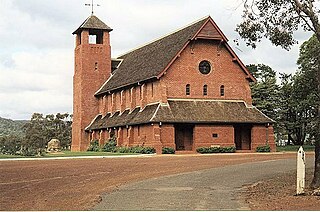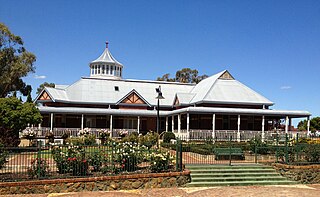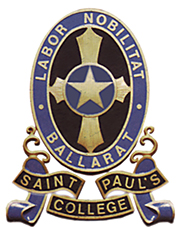
The Institute of the Brothers of the Christian Schools is a Catholic religious teaching congregation, founded in France by a priest named Jean-Baptiste de La Salle (1651–1719), and now based in Rome. The Brothers use the post-nominal abbreviation FSC to denote their membership of the order, and the honorific title Brother, abbreviated Br. The Lasallian Christian Brothers are not the same order as the Irish Christian Brothers.

New Norcia is a town in Western Australia, 132 km (82 mi) north of Perth, near the Great Northern Highway. It is situated next to the banks of the Moore River, in the Shire of Victoria Plains.

Home Children was the child migration scheme founded by Annie MacPherson in 1869, under which more than 100,000 children were sent from the United Kingdom to Australia, Canada, New Zealand, and South Africa.

St Gregory's College is an independent Roman Catholic single-sex and co-educational comprehensive and specialist primary and secondary day and boarding school, located in Gregory Hills, near Campbelltown, a south-western suburb of Sydney, New South Wales, Australia. With specialist expertise as an agricultural school, St Gregory's College provides a co-educational environment for students in the Year K to Year 6 primary school; and a boys-only environment for students in the Year 7 to Year 12 secondary schools.
The Forde Inquiry (1998–1999), or formally the Commission of Inquiry into Abuse of Children in Queensland Institutions, was a special inquiry into child abuse in the state of Queensland, Australia, presided over by Leneen Forde AC, a former Governor of Queensland. Assisting Ms Forde were Dr Jane Thomason and Mr Hans Heilperm.

The Roman Catholic Diocese of Ballarat, based in Ballarat, Australia, is a diocese in the ecclesiastical province of Melbourne. It is a suffragan diocese of the Archdiocese of Melbourne and was established in 1874. Its geography covers the west, Wimmera and Mallee regions of Victoria. The cathedra is in St Patrick's Cathedral, Ballarat.

St Patrick's College, sometimes referred to as "St Pat's", "Paddy's" or "SPC", is an Australian school founded by the Christian Brothers in 1893. It is a Roman Catholic day and boarding school, located in Ballarat, Victoria. It provides education for boys from Year 7 to Year 12, with an emphasis on academic and sporting programs. The school continues the tradition of the Christian Brothers in providing education for boys in Victoria and continuing the tradition of Edmund Ignatius Rice, who founded the Congregation of Christian Brothers in 1802.

Bindoon is a town 84 kilometres (52 mi) from Perth city on the Great Northern Highway within the Shire of Chittering. The name Bindoon is thought to be Aboriginal in origin and to mean "place where the yams grow". The name has been in use in the area since 1843 when an early settler, William Brockman, named the property he had surveyed as Bindoon. The townsite was gazetted in 1953.

Clontarf Aboriginal College is a co-educational Aboriginal college for indigenous youth aged between 15 and 18 years, located in the Perth suburb of Waterford in Western Australia. Since 2000 the College has also been the centre for the Clontarf Football Academy run by the Clontarf Foundation a program of Australian rules football for indigenous youth.
Brother Paul Francis Keaney, MBE, ISO was an accused child molestor and Irish-born Australian Catholic educator.

As distinct from abuse by some parish priests, who are subject to diocesan control, there has also been abuse by members of Roman Catholic orders, which often care for the sick or teach at school. While diocesan clergy have arranged parish transfers of abusive priests, so also the Orders' members have been found to relocate abusive Brothers to other places.
The sexual abuse scandal in the Congregation of Christian Brothers is a major chapter in the series of Catholic sex abuse cases in various Western jurisdictions.
Catholic sexual abuse cases in Australia, like Catholic sexual abuse scandals elsewhere, have involved convictions, trials and ongoing investigations into allegations of sex crimes committed by Catholic priests, members of religious orders and other personnel which have come to light in recent decades, along with the growing awareness of sexual abuse within other religious and secular institutions. Criticisms of the Church have centred both on the nature and extent of abuse, and on historical and contemporary management of allegations by Church officials. Internally, the Church began updating its protocols in the 1990s, and papal apologies for abuse in Australia were made by Pope John Paul II and Pope Benedict XVI. A number of government enquiries have also examined church practices - most notably the 2015-17 Royal Commission into Institutional Responses to Child Sexual Abuse. The Royal Commission established that some 4,444 claimants alleged incidents of child sexual abuse in 4,756 reported claims to Catholic Church authorities and at least 1,880 suspected abusers from 1980 to 2015. Most of those suspected of abuse were Catholic priests and religious brothers and 62 percent of the survivors who told the commission they were abused in religious institutions were abused in a Catholic facility.
Forgotten Australians is a contested term applied by some to the estimated 500,000 children and child migrants who experienced care in institutions or outside a home setting in Australia during the 20th century. The Australian Senate used the term specifically when reporting on its 2003–2004 "Inquiry into Children in Institutional Care".

Fairbridge, Western Australia is a former farm school near Pinjarra in south west Western Australia. It is now used predominantly for education, school and community camps and tourism purposes.
Gerald Francis Ridsdale, an Australian laicised Catholic priest, was convicted between 1993 and 2017 of a large number of child sexual abuse and indecent assault charges against 65 children aged as young as four years. The offences occurred from the 1960s to the 1980s while Ridsdale worked as a school chaplain at St Alipius Primary School, a boys‘ boarding school in the Victorian regional city of Ballarat. Royal Commission into Institutional Responses to Child Sexual Abuse found that senior figures in the church knew about Ridsdale's abusing children but protected him. Ridsdale was ordained at St Patrick's Cathedral in Ballarat in 1961. The first complaint about his behaviour towards children was received by the church that same year. Ridsdale held 16 different appointments over a period of 29 years as a priest, with an average of 1.8 years per appointment.

Castledare Boys' Home was a residential college in Wilson, Western Australia owned and operated by the Congregation of Christian Brothers from March 1929 to 1983 and established for the treatment and training of intellectually handicapped children. A 1929 newspaper article announcing the opening described it as a "training school for sub-normal boys". It opened with ten boys and under the directorship of Brother G. Hyland. The state psychologist, Ethel Stoneham, travelled to Europe and the United States to study similar institutions and was influential in the design of the home.

St Paul's College, formerly St Paul's Technical College and St Paul's Technical School, was a Catholic boys school in Ballarat.

















